|
|
|
Sort Order |
|
|
|
Items / Page
|
|
|
|
|
|
|
| Srl | Item |
| 1 |
ID:
191720


|
|
|
|
|
| Summary/Abstract |
Policy hybrids, which combine marketizing and liberalizing reforms with social welfare programmes and state support to boost domestic production, are fast becoming the norm globally. How are neo-liberal and national-developmentalist agendas reconciled as governing practices, and what are their national and international outcomes and implications? This article focuses on the understudied case of India, arguing that a paternalist political rationality, which melds paternalist logics in neo-liberalism and the government's Hindutva civilizationalist politics, underpins its flagship economic policy, the Atmanirbhar Bharat Abhiyan (Self-reliant India Mission). This policy, through production-linked incentives, aims to boost Indian manufacturing. India has benefited from a global push to diversify supply chains and forge new geopolitical partnerships, such as the Quad, to undermine China's manufacturing dominance and geopolitical assertiveness. Yet, its current approach consolidates the dominance of large firms, producing an elitist political economy, and does not address structural weaknesses through public investment in areas like research and education. This has implications for India's development, global trade and geopolitics. These arguments are made by identifying the paternalist logics in the theories and practices of neo-liberalism, and in Hindutva civilizationalist politics; assessing the aims of the Atmanirbhar Bharat Abhiyan as elaborated by government officials; and evaluating the early outcomes of production-linked incentive schemes.
|
|
|
|
|
|
|
|
|
|
|
|
|
|
|
|
| 2 |
ID:
171955
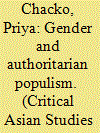

|
|
|
|
|
| Summary/Abstract |
The promotion of conservative gender values has been a feature of the rise of authoritarian populism globally. This paper argues that India’s ruling Bharatiya Janata Party (BJP) uses populist strategies to promote a political project of marketized Hindutva, which melds neoliberalism and Hindu nationalism and appeals to men and women in distinctive ways. This reflects the gendered nature of neoliberalism, electoral imperatives and the patriarchal gender values of Hindu nationalism. Using populist discursive and mobilizational strategies, the BJP aims to suture together a broad social base, represented as “the people,” through the creation of an aspirational identity. Concurrently, it stokes resentment against establishment elites and religious minorities for holding back the people’s aspirations. This politics of resentful aspiration underpins an empowerment agenda of marketized social policies targeted at turning poor and lower-middle class women into virtuous market citizens who embody neoliberal rationalities and Hindu nationalist social values. It also drives a protection agenda mobilizing young, lower-middle class men and the strong arm of the state to protect women’s capacity to become virtuous market citizens. These agendas claim to empower and protect women but are deeply disempowering for the women and men they target and contain inherent contradictions.
|
|
|
|
|
|
|
|
|
|
|
|
|
|
|
|
| 3 |
ID:
115371


|
|
|
|
|
| Publication |
Oxon, Routledge, 2012.
|
| Description |
ix, 237p.
|
| Standard Number |
9780415665681
|
|
|
|
|
|
|
|
|
|
|
|
Copies: C:1/I:0,R:0,Q:0
Circulation
| Accession# | Call# | Current Location | Status | Policy | Location |
| 056821 | 327.54/CHA 056821 | Main | On Shelf | General | |
|
|
|
|
| 4 |
ID:
164880
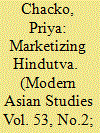

|
|
|
|
|
| Summary/Abstract |
The embrace of markets and globalization by radical political parties is often taken as reflecting and facilitating the moderation of their ideologies. This article considers the case of Hindu nationalism, or Hindutva, in India. It is argued that, rather than resulting in the moderation of Hindu nationalism, mainstream economic ideas are adopted and adapted by its proponents to further the Hindutva project. Hence, until the 1990s, the Hindu nationalist political party, the Bharatiya Janata Party (BJP), its earlier incarnation, the Jana Sangh, and the grass-roots organization, the Rashtriya Swayamsevak Sangh (RSS), adopted and adapted mainstream ideas by emphasizing the state as the protector of (Hindu) society against markets and as a tool of societal transformation for its Hindu nationalist support base. Since the 1990s, Indian bureaucratic and political elites, including in the BJP, have adopted a view of the market as the main driver of societal transformations. Under the leadership of Narendra Modi, in particular, the BJP has sought to consolidate a broader support base and stimulate economic growth and job creation by bolstering the corporate sector and recreating the middle and ‘neo-middle’ classes as ‘virtuous market citizens’ who view themselves as entrepreneurs and consumers but whose behaviour is regulated by the framework of Hindu nationalism. These policies, however, remain contested within the Hindu nationalist movement and in Indian society generally. The BJP's discourse against ‘anti-nationals’ and the use of legal sanctions against dissent is an attempt to curb these challenges.
|
|
|
|
|
|
|
|
|
|
|
|
|
|
|
|
| 5 |
ID:
134572
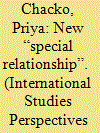

|
|
|
|
|
| Summary/Abstract |
This article argues that power transitions generate not just physical security concerns for states, but also “ontological” insecurity, as established identities, hierarchies, and relationships are revised and challenged. It is suggested that seeking out “special relationships” with others is one way in which states seek to mitigate this uncertainty. Through an analysis of the discourse on the “rise of India” from policymakers and commentators in the United States, it is shown that recent US representations of India seek to consolidate a particular US identity, based on the notion of American exceptionalism, and attempt to construct a new “special relationship” with India in order to ameliorate the challenge posed by the rise of China to a US-dominated world order and the assumption of the universality of US ideas and institutions. However, while India–US relations have improved, the relationship continues to be hampered by their differing world-views and self-perceptions, which, as in the past, undermine each other's sense of ontological security.
|
|
|
|
|
|
|
|
|
|
|
|
|
|
|
|
| 6 |
ID:
167691
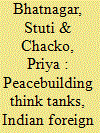

|
|
|
|
|
| Summary/Abstract |
Foreign policy making in India is typically viewed as highly centralised and dominated by the Prime Minister’s Office and bureaucracy. Yet in 2004, the Congress-Party-led United Progressive Alliance government launched a Composite Dialogue with Pakistan which included a place for Indian think tanks in the Kashmir dispute. We suggest that as India liberalised its economy amidst domestic political upheaval, think tanks were given greater access to domestic and foreign funding and adopted new roles in foreign policy making. In the case of the Kashmir conflict, peacebuilding think tanks were encouraged by the government to engage in cross-border activities that would build constituencies for peace with Pakistan and promote economic cooperation as an incentive for peace. While the government aimed to depoliticise the conflict, these think tanks used this opportunity to draw attention to marginalised perspectives and issues. Peacebuilding think tanks nonetheless faced significant challenges in shaping the peace process because of structural constraints regarding access to resources and lack of autonomy to further their agendas. This reflected resistance within the state to depoliticising a conflict that has long been India’s central national security issue.
|
|
|
|
|
|
|
|
|
|
|
|
|
|
|
|
| 7 |
ID:
160609
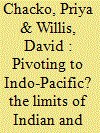

|
|
|
|
|
| Summary/Abstract |
Proponents of the Indo-Pacific concept assume that growing economic and societal linkages and the need for greater political and security cooperation and order-building are leading to the integration of the region. India and Indonesia were thought to be crucial in these processes of regionalisation and regionalism and were early adopters of the Indo-Pacific idea. The purpose of this paper is to evaluate the extent to which the Indo-Pacific initiatives of India and Indonesia are leading to the integration of the Asia-Pacific and Indian Ocean regions through greater Indian involvement with the Pacific region and stronger Indonesian engagement with the Indian Ocean region. It is argued that an interlinked set of security and economic concerns drove India and Indonesia’s adoption of the Indo-Pacific idea. In both cases, a desire for economic growth and preventing Chinese economic and political dominance in the region were important drivers. However, the nature of the political economies of India and Indonesia does not readily facilitate extensive economic linkages or strategic interests beyond their immediate regions. Moreover, both countries are wary of being seen as members of anti-China coalitions due to the impact this may have on regional stability and their domestic political and economic priorities. These factors place significant limitations on the regional integration of the Indo-Pacific.
|
|
|
|
|
|
|
|
|
|
|
|
|
|
|
|
| 8 |
ID:
172234
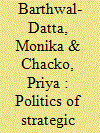

|
|
|
|
|
| Summary/Abstract |
This paper investigates India and Australia’s respective strategic narratives of regional order in the Indo-Pacific. Despite apparently significant convergences in their terminology around the desire for a ‘stable’, ‘prosperous’, ‘open’, ‘free’ and ‘inclusive’ Indo-Pacific, the regional order narratives of India and Australia each promote a distinct conception of regional order, reflecting different sets of political, geopolitical, economic and institutional concerns and agendas. India’s narrative promotes ‘issue-based’ alliances with a variety of countries including China, Russia and the United States, to promote a multipolar regional order, and reflects a long-standing desire to culturally identify and economically integrate with East Asian states. Australia’s narrative seeks to perpetuate the post-World War II status quo in the region, with respect to the continuation of a dominant US presence. It promotes closer partnerships with countries like India, Japan and Indonesia, within a US-led regional order, to diversify its economic and security relationships amidst perceptions of China’s growing assertiveness. It also carves out a central strategic role for Australia in a region where its leaders have traditionally felt like ‘outsiders’. The analysis advances a cultural political economy (CPE) approach to strategic narratives, demonstrating how and why strategic narratives are formed, projected and received at particular junctures.
|
|
|
|
|
|
|
|
|
|
|
|
|
|
|
|
| 9 |
ID:
131827
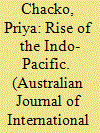

|
|
|
|
|
| Publication |
2014.
|
| Summary/Abstract |
In 2011, the concept of the Indo-Pacific began to appear in India's foreign policy discourse. This article argues that rather than signalling a dramatic shift in India's foreign policy, however, the way in which the Indo-Pacific has been interpreted by the Indian leadership suggests significant continuity as well as change, which is contrary to the goals of the concept's most fervent proponents in India. The article seeks to develop a framework for understanding ideational change and continuity in foreign policy by theorising the interplay between ideas, political and economic flux, and social expectations related to effective and legitimate state-building. It is argued that the Indo-Pacific concept has instigated a new emphasis on regional architecture-building to manage the ongoing regionalisation in the area between the Indian and Pacific Oceans as a result of heightened trade flows and production and investment linkages. Yet, the Indo-Pacific concept, like the new policy ideas on regional engagement that preceded it-the Look East policy and the 'extended neighbourhood'-has been articulated in ways that are also compatible with long-standing ideas-such as non-alignment-about what constitutes appropriate international behaviour. This reflects the nature of the broader state project that has emerged since 1990, which, while encompassing a new focus on economic growth and competitiveness as being essential to effective state-building, continues to prioritise older ideas about what constitutes effective and legitimate state-building.
|
|
|
|
|
|
|
|
|
|
|
|
|
|
|
|
| 10 |
ID:
101741
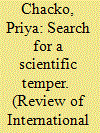

|
|
|
|
|
| Publication |
2011.
|
| Summary/Abstract |
This article examines the relationship between India's nuclear programme and its postcolonial identity. In particular, I argue that making sense of the anomalies and contradictions of India's nuclear behaviour, such as the gap of two decades between its nuclear tests, its promotion of nuclear disarmament and its failure to sign non-proliferation and test-ban treaties requires an understanding of the racially gendered construction of India's postcolonial modernity and the central roles given to science and morality within it. I suggest that India's postcolonial identity is anchored in anticolonial discourses that are deeply ambivalent toward what was viewed as a Western modernity that could provide material betterment but was also potentially destructive. What was desired was a better modernity that took into account what was believed to be Indian civilisation's greater propensity toward ethical and moral conduct. India's nuclear policies, such as its pursuit of nuclear technology and its promotion of disarmament cannot be seen in isolation from the successes and failures of this broader project of fashioning an ethical modernity.
|
|
|
|
|
|
|
|
|
|
|
|
|
|
|
|
| 11 |
ID:
151994
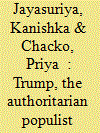

|
|
|
|
|
| Summary/Abstract |
In this short article, the authors analyse the implications of the election of Donald Trump for the future of the liberal rules-based order, with specific emphasis on its implications for the Asian region. Departing from the institutional fetishism that figures prominently in the literature, the authors argue that this liberal order needs to be conceptualised in terms of its social foundations. Particularly important to consider, in terms of understanding these social foundations, is the nature of social relations in the USA. The election of Trump reflects the deep crisis of the US state and the rise of a new ‘authoritarian populism’. The authors trace the roots of this authoritarian populism to patterns of global capitalist transformation, the crisis of the US state and the modes of crisis management that this has generated. They then explore the implications of Trump’s authoritarian populism for the region.
|
|
|
|
|
|
|
|
|
|
|
|
|
|
|
|
| 12 |
ID:
152044
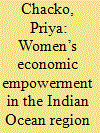

|
|
|
|
|
| Summary/Abstract |
Women’s economic empowerment (WEE) can be defined as the process of change that gives women (i) access to and control over resources and markets; (ii) increased agency and choice and; (iii) the capacity to improve and control specific outcomes or achievements (such as enhanced well-being and dignity and improved economic opportunities); and (iv) the ability to influence the wider policy, regulatory and institutional environment (WIEGO, 2016 WIEGO. (2016). Women’s Economic Empowerment: WIEGO Position and Approach. WIEGO. Retrieved August 30
|
|
|
|
|
|
|
|
|
|
|
|
|
|
|
|
|
|
|
|
|